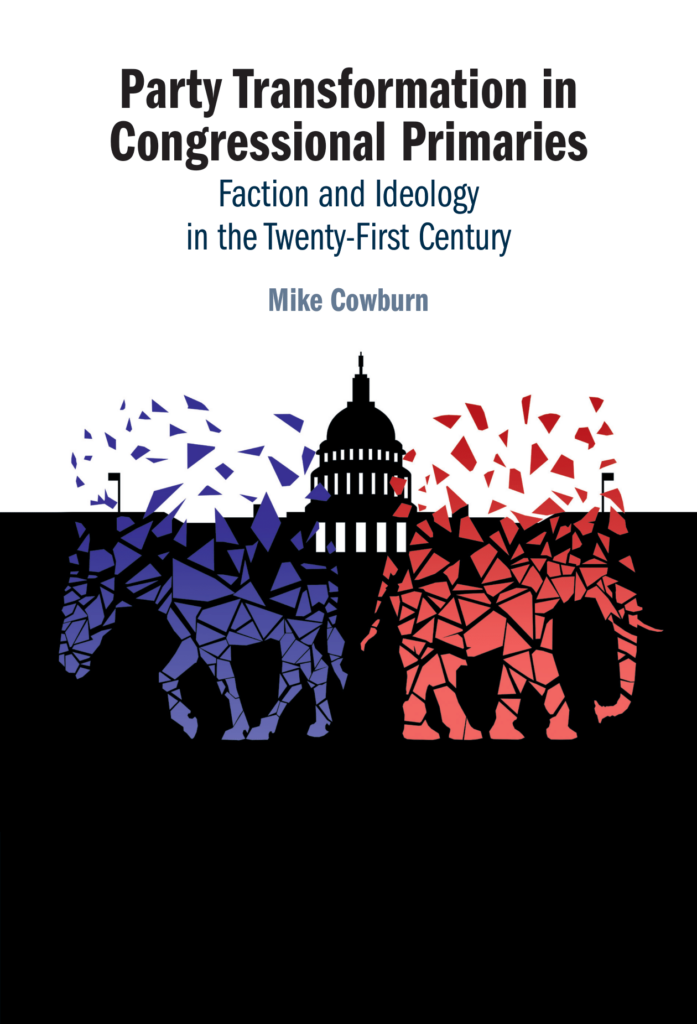Welcome!
I’m Mike, a research fellow in the Department of Political & Social Sciences at Zeppelin Universität. I work in the ERC-funded DEMOLAW project, examining the design, creation, and survival of legislation in the United States, United Kingdom, and European Union.
My research interests include intra-party factions, candidate selection, legislative politics, and political communication. My first book examines U.S. intra-party factions in congressional primary elections in the twenty-first century and considers their contribution to trends of partisan polarization in Congress. My research has also been published in many peer-reviewed journals, including Political Science Research & Methods, British Journal of Political Science, Political Communication, Political Research Quarterly, and Party Politics.
I regularly appear as a political analyst in media outlets, providing insight and commentary about U.S. and U.K. politics. If you are interested in booking me, please email me.
Research
Book

Cambridge University Press 2024.
Party Transformation in Congressional Primaries explains how the process through which candidates run for Congress fundamentally changed during the twenty-first century. These changes then reverberated in polarizing the parties in Congress. Primaries are commonly said to drive polarization because of the people who vote in them, but I show instead that the nomination process exacerbates polarization through the influence of elite party actors incentivizing candidates to adopt more ideological behavior.
You can read the introduction here and order the book here.
Peer-Reviewed Publications
Cowburn, Mike and Meredith Conroy. 2026. “Where do Women Win Primaries? Candidate Gender, District Partisanship, and Congressional Nomination”. Journal of Women, Politics, and Policy. 47(1):1–21.
Knüpfer, Curd, Yunkang Yang, and Mike Cowburn. 2025. “The Logic of Connective Faction: How Hyper-Partisan Media and Highly-Networked Elites Mainstream Radical Ideas”. Political Communication. 1–33.
Hurka, Steffen, Stefanie Rueß, Mike Cowburn, Constantin Kaplaner. 2025. “Laws as Blades: A Conceptual Framework of Legislative Design“. Policy Sciences. 58: 733–752.
Cowburn, Mike, Ulrike Klinger, and Anders Olof Larsson. 2025. “Campaigning in the Age of Platforms: A Longitudinal Analysis of German Parties & Politicians”. Political Communication.
Peißker, Antonia, Mike Cowburn, and Ulrike Klinger. 2025. “Disinformation Resilience in Backsliding Democracies: Media Trust, Civil Society, and Institutional Capture.” Weizenbaum Journal of the Digital Society. 5(2):1–21.
Cowburn, Mike and Sean M. Theriault. 2025. “Preventative Polarization: Republican Senators’ Adaptation in the Tea Party Era” American Politics Research. 52(2): 125–139.
Cowburn, Mike and Marius Sältzer. 2025. “Partisan Communication in Two-Stage Elections: The Effect of Primaries on Intra-Campaign Positional Shifts in Congressional Elections”. Political Science Research & Methods. 13(2): 392–411.
Blum, Rachel M., Mike Cowburn, and Seth Masket. 2024. “Who Decides? Media, Maga, Money, and Mentions in the 2022 Republican Primaries”. Political Research Quarterly. 77(4): 1314–1332.
Rosa, Christoph and Mike Cowburn. 2024.“Review of F-R-O-G Telegram Scraper”. Mobile Media & Communication. 12(2): 454–457.
Cowburn, Mike and Curd B. Knüpfer. 2024. “The Emerging Fault Line of Alternative News: Intra-Party Division in Republican Representatives’ Media Engagement”. Party Politics. 30(2): 319-333.
Blum, Rachel M. and Mike Cowburn. 2024. “How Local Factions Pressure Parties: Activist Groups & Primary Contests in the Tea Party Era”. British Journal of Political Science. 54(1): 88-109.
Cowburn, Mike and Rebecca Kerr. 2023. “Inclusivity and Decentralisation of Candidate Selectorates: Factional Consequences for Centre-Left Parties in England, Germany, and the United States”. Political Research Quarterly. 72(1): 292-307.
Cowburn, Mike and Michael T. Oswald. 2021. “Legislator Adoption of the Fake News Label: Ideological Differences in Republican Representative Use on Twitter”. The Forum 18(3): 389–413.
Book Chapters
Cowburn, Mike, and Marius Sältzer. 2025. “Candidate Characteristics in Primary Elections: An Analysis of U.S. House Candidates in 2024”. in Robert G. Boatright and Richard Barton (eds.) Reforming Primary Elections: Voters, Campaigns, and the Future of Congressional Politics. De Gruyter.
Cowburn, Mike. 2024. “Factional Change and Continuity in the 2022 House Primaries.” in Renata Duda and Maciej Turek (eds.) The Crossroads Election: European Perspectives on the 2022 Midterm Elections in the United States. Routledge.
Cowburn, Mike. 2022. “Experience Narratives and Populist Rhetoric in U.S. House Primaries” in Michael T. Oswald (ed.) The Palgrave Handbook of Populism. Palgrave Macmillan.
Cowburn, Mike. 2020. “The Transformation of the Congressional Primary” in Michael T. Oswald (ed.) Mobilization, Representation and Responsiveness in The American Democracy. Palgrave Macmillan.
Research in Progress
Cowburn, Mike, Amelia Malpas, and Rachel M. Blum. “Comparing Factional Conflict: A Comparative Approach Using Party Leadership Contests” [Revised & Resubmitted].
Gomez, Gabriel, Amanda Sahar D’Urso, and Mike Cowburn. “Hispanic Support for Donald Trump: A System Justification Explanation”. [Under Review].
Kaplaner, Constantin, Mike Cowburn, Steffen Hurka, and Stefanie Reuß. “Balancing Versatility and Precision: A Framework for Capturing Legislative Design Choices in Democratic Systems”. [Working Paper].
Cowburn, Mike, Steffen Hurka, Constantin Kaplaner, and Stefanie Reuß. “Divided We Legislate: How Elite Polarization Shapes Legislative Design”. [Working Paper].
Datasets
Cowburn, Mike. 2024. “Congressional Primary Elections in the Twenty-First Century Dataset”. Harvard Dataverse, V1. https://doi.org/10.7910/DVN/D03ULS
Commentary & Analysis
Cowburn, Mike. 2024. “The 2024 Elections: Primary Elections Show Just How Factionalized the Democratic and Republican Parties Have Become.” LSE United States Politics & Policy Blog
Cowburn, Mike, and Marius Sältzer. 2024. “Winning Primary Candidates Don’t Moderate their Political Positions, Increasing Polarization in Congress.” LSE United States Politics & Policy Blog.
Blum, Rachel M. and Mike Cowburn. 2023. “The Long Shadow of the Tea Party and the Republican Party’s Shift to the Right.” LSE United States Politics & Policy Blog.
Cowburn, Mike and Curd Knüpfer. 2023. “Far-Right News Sites have been Radicalizing Republican Politicians and are Dividing the Party.” LSE United States Politics & Policy Blog.
Cowburn, Mike. 2022. “The 2022 Midterms: A Turning Point for the Democratic and Republican Parties in Congress.” LSE United States Politics & Policy Blog.
Cowburn, Mike. 2020. “Not Just the Presidency: Congressional Primaries 2020.” Atlantische Akademie.
Cowburn, Mike. 2020. “Fostering Engagement in Primaries and Caucuses.” PolticalScienceNow.
Teaching
| 2024/5 | Quantitative Methods for Social Science |
| 2024/5 | Empirical Research Design & Writing in Social Science |
| 2024 | Introduction to U.S. Politics |
| 2024 | Politics & Football (Soccer) |
| 2023/4 | Quantitative Methods for Social Science |
| 2023/4 | Empirical Research Design & Writing in Social Science |
| 2023 | Media & Democracy |
| 2023 | Political Parties in the Digital Era |
| 2021 | U.S. Political Parties in a Partisan Era |
| 2019 | Polarization in US Politics |
| 2018 & 2019 | Teaching Assistant – Understanding North America (Political Science) |
Education
| 2019-2022 | Ph.D. Political Science Freie Universität Berlin – summa cum laude |
| 2017-2019 | MA North American Studies Freie Universität Berlin – 1.0 |
| 2005-2008 | BA Politics University of Exeter – 2:1 Hons |
